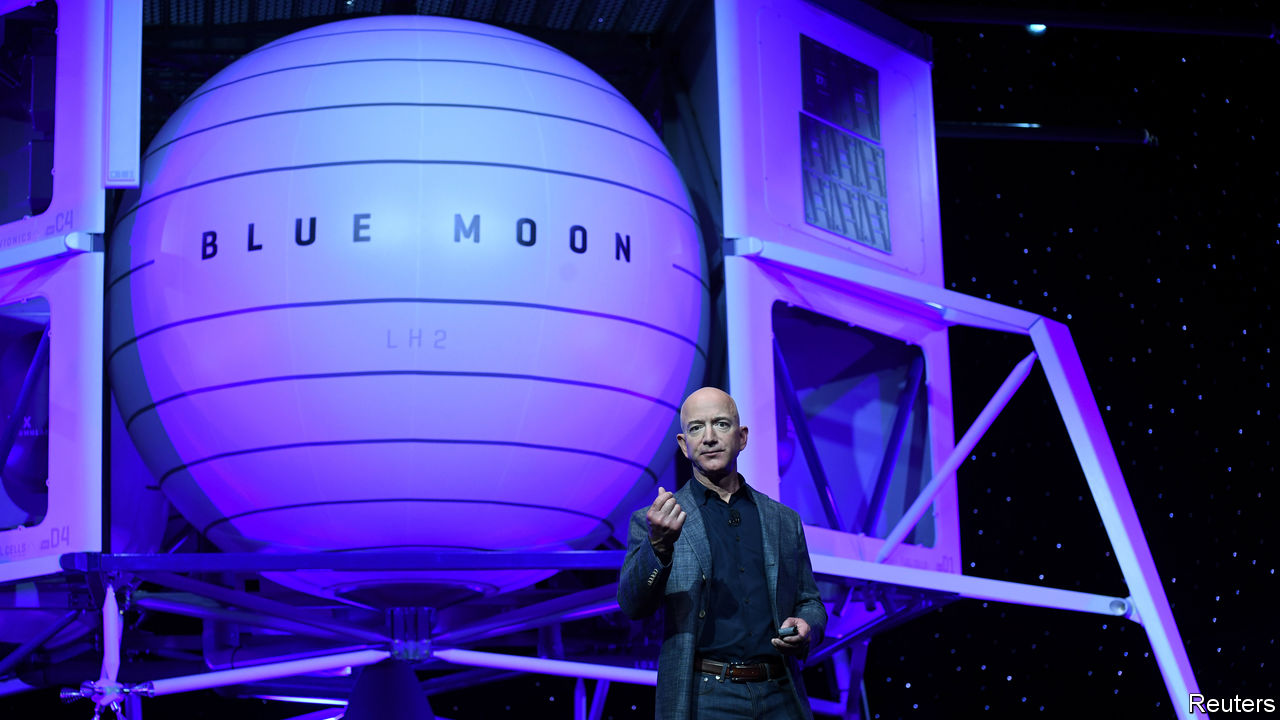
LITERARY TYPES have long been sniffy about science fiction. Ian McEwan, a feted British novelist, has been at pains to distance his most recent book, about an intelligent android, from “sci-fi”, even though the idea is one of the most picked-over tropes in the genre. Such snobbery is misplaced. Humans are technological animals. Science fiction explores how that power might be used, what sorts of worlds might be built with it and what sublime new estrangements and transcendence may follow. It is a literature of ideas, and, as John Maynard Keynes observed (in a different context), the world is ruled by little else. To see the force of Keynes’s point, consider how the world’s richest man plans to spend his fortune.
On May 9th Jeff Bezos outlined his thoughts about the future of humanity. The founder of Amazon sells $1bn-worth of shares a year to fund his rocket company, Blue Origin, which wants to cut the cost of space flight, put tourists into space and help return humans to the moon. That is only the first part of a grander scheme to spread humanity throughout the solar system in artificial habitats. He is not alone. Elon Musk founded SpaceX with the goal of establishing a self-sufficient colony on Mars. Yuri Milner, another tycoon, has promised $100m to send a robot to Alpha Centauri, the closest star system to the sun.
Mr Bezos is open about his influences. He grew up reading Isaac Asimov and Robert Heinlein, with their stories of rebellious lunar colonies, idiot-savant robots and societies founded on “psychohistory”, an amalgam of economics, history and what is now called big data. “Star Trek”, with its humane, liberal and internationalist re-imagining of the American frontier spirit, was another favourite. Decades later, Mr Bezos is using his money to help bring such a future about, rather as Heinlein’s D D Harriman did in “The Man Who Sold the Moon”.
Scratch a Silicon Valley nerd and chances are you will find similar influences, and similar ideas about how the future should look. One of the tech industry’s favourite writers is Iain M Banks, a Scottish socialist whose knockabout space operas were set in and around “the Culture”, a spacefaring utopia. Amid worries about superintelligent computers and robots taking jobs, they are a tonic. In Mr Banks’s society robots have indeed taken all the jobs, but the result is inexhaustible material abundance. Sentient beings, organic or artificial, are free to flourish. Everything is run by nigh-omnipotent and mostly benevolent AI philosopher-kings.
His influence runs deep. A meeting room at DeepMind, a big AI firm, is named in his honour. When Mark Zuckerberg, the boss of Facebook, ran a book club in 2015, only two of his 23 recommendations were novels. Mr Banks’s “The Player of Games” was one. (“The Three-Body Problem”, a piece of science fiction by Liu Cixin, was the other). Mr Musk named SpaceX’s rocket-recovery “droneships” after AI-animated spaceships in Mr Banks’s “Culture” books. In 2018 Mr Bezos announced plans to film those books, as well as Larry Niven’s “Ringworld” and “Snow Crash”, a cyberpunk novel by Neal Stephenson—who was, for some of Blue Origin’s early days, its only employee.
Many of Silicon Valley’s favourite stories feature grand, mostly benign futures. Of course, technology can change people, as well as the societies they build. Ursula le Guin has speculated about how societies might look when genetic engineering makes seemingly basic biological categories, like sex, fluid and malleable. Those who worry more about the perils of technology than its promises will find plenty to chew on, too. “1984” needs no introduction. Masayoshi Son, the boss of Softbank, worries about the “Singularity”, when machine intelligence exponentially exceeds the human sort and technological progress escapes all attempts at control. The term was popularised by Vernor Vinge, an American computer scientist and sci-fi author, and remains a hot topic in tech circles. Margaret Atwood has written of societies in the aftermath of technological apocalypses—although she, like Mr McEwan, resists the “sci-fi” label. Kim Stanley Robinson’s “New York 2140” is set in that city after it has been flooded by climate change.
One influential proponent of a less starry-eyed attitude to the future is William Gibson, who made his name by rejecting the togas-and-crystal-spires view common in mid-century sci-fi. His “high tech and low life” style of fiction, in which hacker gangs steal information for money and the rich grow ever more detached from the societies that sustain them, was prescient. Two of his aphorisms—that “the future is already here, it’s just not evenly distributed” and “the street finds its own use for things”—have become received wisdom for futurists. If you want to understand how those who are building the future think, ignore the snobs. Sci-fi is the place to start.
Correction (May 25th 2019): This article originally identified Yuri Milner as Russian; he is a Russian born Israeli citizen who lives in America.







